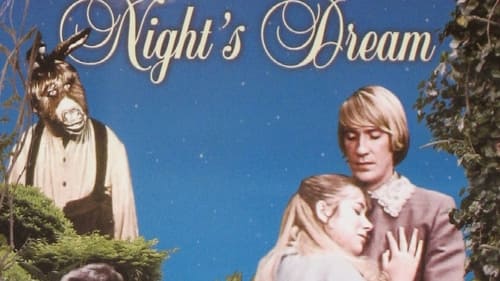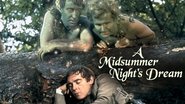GusF
As with "Much Ado About Nothing" and "Romeo and Juliet", this is another Shakespearean play with which I was only familiar through reputation but I have been familiar with three of its characters for most of my life. My first exposure to Shakespeare was through the classic 1990s animated series "Gargoyles" in which Puck, Oberon and Titania were all recurring characters, as were Macbeth and the Three Witches. One of the cleverest and most complex of the Shakespearean plays which I have read or seen performed, it features three interconnected story lines and wonderfully blends the lines between fantasy and reality. The play is also extremely witty and occasionally downright hilarious. Made by the Royal Shakespeare Company, it has one of the best casts of any film that I have ever seen: Judi Dench, Ian Richardson, David Warner, Helen Mirren (who also appeared in the 1981 BBC adaptation, though as Titania rather than Hermia), Diana Rigg, Michael Jayston and Ian Holm. Rigg was already very famous for her role as Emma Peel in "The Avengers" and Warner had starred in several big films such as "Tom Jones" and "Morgan - A Suitable Case for Treatment". While most of the other cast members were not well known for their on screen work in 1968, they became so in the years and decades that followed. The strongest performer is certainly Judi Dench, whom I consider to be the best living actress. She is captivating as the proud, forceful queen of the fairies whose dispute with her husband Oberon, played wonderfully by Richardson, serves as the catalyst for the events of the play. However, she is just as good in the scenes in which she is required to be softer such as those with the fairy children (two of whom are played by her nieces Clare and Emma) and those in which she professes her love to Bottom after Puck has given him the head of a donkey. All of the actors whom I have mentioned are top notch but I have to single out Rigg as the kind and vulnerable Helena who sharply feels the pangs of her unrequited love for the Hermia loving Demetrius, who can't stand her until the fairies have their way with him, and Warner as the dashing, romantic Lysander, who adores Hermia until the fairies have their way with him and then comes to despise her before going back to adoring her! For much of his later career, he was typecast as sinister characters and was and is excellent at that but it's always great to see him play a gentler character (for the most part, anyway).The rest of the film's cast is just as strong, particularly Paul Rogers as Bottom (who also played the role in a 1958 TV adaptation), Sebastian Shaw as Quince, Derek Godfrey as Theseus, Barbara Jefford as Hippolyta and Bill Travers as Snout, who was one of the then best known actors in the film in spite of his fairly small role. Rogers, one of the few actors in the film with whom I was largely unfamiliar, is an absolute laugh riot as the overly enthusiastic Bottom, who seeks to take over the play-within-the-play "Pyramus and Thisbe" by playing every part himself. I wonder if the exasperation felt by Quince whenever Bottom made a suggestion came from Shakespeare's own experience working with difficult actors. With his infectious hearty laugh, Rogers is even funnier once he receives the head of a donkey. The scenes with Judi Dench in which Titania fawns over Bottom are the funniest in the entire film.In spite of the strength of its cast, however, the film is not perfect. Peter Hall may have been a great theatre director and the British theatrical world owes him a huge debt for founding the RSC but he was not a good film director. Compared to other Shakespearean films that I have seen, this one is shot in a fairly mechanical, workmanlike fashion and the editing is often very bad. Laurence Olivier and Kenneth Branagh's versions of "Hamlet" and Zeffirelli's "Romeo and Juliet" were all beautiful looking films but, in spite of the location work, this seems more like a filmed stage play rather than a film adaptation of one. As much as I loved Bottom, the scenes featuring the entire acting troupe were the least interesting of the play. Consequently, the film drags a bit after Lysander, Hermia, Demestrius and Helena leave the forest. While the acting troupe's terrible production was funny, it was not as funny as it could have been and went on a bit long. Since I haven't read the play, however, I don't know what, if anything, was left out and the final act may have been better structured if it had been performed in full.If it were to rate this film based solely on the acting, I would give it full marks without hesitation but there are other issues to consider so I can't, I'm afraid.
Syl
THere are three British dames in this film adaptation: Dame Judi Dench, Dame Diana Rigg and Dame Helen Mirren. While the cast is outstandingly directed by Sir Peter Hall, the costumes appear to be weak and cheaply made. When Titania played by Dame Judi Dench kisses a horses' behind, you can see his eyes. The costumers dressed Titania as a green fairy which was just painted on like silly. The William Shakespeare play is a festive comedy for the light-hearted and entertainment of its audience. It's not an expensive production but it's worth watching to see three Dames in their younger days. Everybody in the cast has been part of the Royal Shakespeare Company and are veteran actors by now. THe play does entertain and I can poke fun at the cheap costumes and lack of expense towards the production. It's nice to see Dame Judi Dench before she was ever a Dame. Not even an O.B.E. in this 1968 production. She appears to enjoy playing the role. Dame Helen Mirren is also cast as the young Helena who seeks to be in love. I probably got the names wrong but it's Shakespeare, who can remember?
Jon Kolenchak
This film has a dream cast. Diana Rigg, Judi Dench, Helen Mirren, and Paul Rogers are especially fine. Yet, the film moves clumsily along with all the cinematographic finesse of a home video. So much of the production values of this film are just plain sloppy. Sloppy makeup and sloppy attention to costume detail are just the beginning of the list of faults. Exactly when was this story supposed to happen? It could have been an Elizabethian period piece, yet methinks it could have been the 1960's based on the women's short skirts and very 'mod' boots. There were touches of the directing style of Ed Wood, also. We enter the forest and it's dark. A few scenes later, the sun is shining, then it's dark again. I can't let this review go by without echoing another reviewer's comment -- What exactly were they doing to get so dirty?!?I did find a way to completely enjoy this film. Don't watch it -- listen to it. It works much better as an audioplay than as a film.
dwpollar
1st watched 5/25/2002 - 4 out of 10(Dir-Peter Hall): Well-intentioned attempt at silly Shakespeare play with some good acting, makeup, and set design, but a muddled mess of a movie. I guess even the masters can make dud's and this sure is one. The central purpose or theme seems to be that human love can last but only with help from a group of god-like fairies who are able to move love from one person to another with the sprinkling of flowers while the human's sleep. What follows is love hopping from one person(or beast) to another but it all gets fixed in the end and the lovers live happily ever after despite their past nights worries due to the constant change in couples. A big piece of fluff from such a serious playwright as Shakespeare just doesn't seem to work and despite some good performances this version I thnk will be forgotten eventually.


